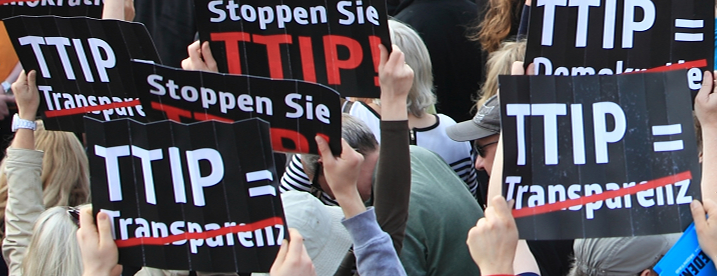
Three Reasons TTIP Needs Transparency
By Michele Fletcher, June 20, 2014

The Transatlantic Trade and Investment Partnership seeks to unite U.S. and EU markets: a gigantic trade deal uniting over 800 million consumers across the United States and the European Union, and yet all its important documents remain shielded from public view. This opacity hasn’t gone unnoticed (see the above photo) and for good reason: free trade without transparency is a dangerous conduit for illicit financial flows and will isolate developing economies. Here, we’ve identified three big reasons financial transparency is crucial for TTIP:
1. Transparency Can Help Eliminate Corporate Tax Evasion and Avoidance
With Fiat, Apple, and Starbucks facing investigations into their transfer pricing practices and offshore subsidiaries, TTIP policymakers would do well to ensure that state aid and tax loopholes are closed. It’s worrisome that over 700 U.S. companies have been able to voice policy recommendations—down to exact legal wording for the partnership—and considering the $180B dollars companies stash abroad, it would be prudent to make sure they aren’t protecting tax-avoiding behavior. With especially sticky issues like transfer pricing, open dialogue about standards and regulations is critical.
So far, a preference for large companies is apparent in the TTIP documents. Upon reading leaked documents from the negotiations, Reinhard Bütikofer, a Member of the European Parliament, stated
The pretty explosive documents acquired show the incredible privileged access that corporate industry is granted by the Commission over the agenda of the trade negotiations, as well as the big business agenda to use TTIP as an almost revolutionary tool in the way that legislation will be written in the future.
The UK and EU have already begun work on beneficial ownership legislation, and the TTIP could provide a platform for the U.S. to follow suit. Transparency will ensure that the UK and EU remain committed to this legislation and aren’t negatively influenced by large company’s agendas behind closed doors. Transparency, by giving a spot for lobbyists, shareholders, and policymakers to voice their concerns on equal footing, may also help push automatic exchange of financial information between the EU and U.S.
2. Low and Middle Income Countries Won’t be Shut Out
Proponents of TTIP argue that the EU and US will not shut out developing economies because they don’t compete in the same sectors. This is true to an extent: non-fuel imports from low-income developing countries are concentrated in four major countries—Bangladesh, Pakistan, Cambodia, and Ghana—accounting for 60% and 83% of EU and U.S. imports from developing countries, respectively. With such a huge stake in the EU and U.S. economies and fairly low competition, it is unlikely these countries will suffer notable losses in trade relations, even if their tariffs remain the same.
But this narrative is incomplete. Even if TTIP doesn’t block developing countries from markets they are already in, TTIP may present considerable barriers for countries trying to enter new markets.
Developing countries are less stagnant than ever. However, because TTIP gives little say to developing countries in its regulations, it may pose problems for countries seeking to expand their production and export portfolio. India, for example, is looking towards entering the pharmaceutical market, which may prove exceedingly difficult in light of EU and U.S. limitations on drug patents and regulation. Developing countries with less capital may also be deterred from developing production capacities because they may find TTIP markets difficult to penetrate.
Smaller, low income countries may find it especially difficult to join new global chains of production. Because they can afford little in the way of R&D, middle and low income countries without natural resources are focusing on intermediate goods production. While this has worked well for high-income countries like China, countries with fewer resources might find the price tag for compliance with EU and U.S. regulations too high. Transparency and involvement of developing countries in TTIP regulations will get the ball rolling on providing developing countries with guidelines for sanitation infrastructure, especially important in areas like fishing and agriculture.
3. High Income Developing Countries Won’t Be Aggressive
Transparency doesn’t only benefit low income countries: it also ensures that high-GDP developing countries like China, India, and Brazil will benefit in the long run from higher global standards and better transparency dialogue.
The TTIP could be instrumental in defining standards for products exported from China and increasing the efficiency of the Chinese economy by delineating economic spheres of influence, thus making both TTIP and Chinese economies more efficient. Furthermore, the inclusion of China in TTIP negotiations—or at the very least making them available to Chinese legislators—will increase future willingness of the Chinese to cooperate on international trade-based money laundering issues. China will be a valuable partner in fighting illicit financial flows, but if TTIP remains a closed and politicized entity, that alliance may be difficult to forge.
Transparency will be the key to defining China’s reaction to TTIP. Because of the TTIP’s undeniable political dimension, opacity will inherently generate instability.
There’s free trade, and then there’s free trade with integrity. Without transparency, TTIP can only be the former.
Photo Source: Flickr/Some Rights Reserved by campact
